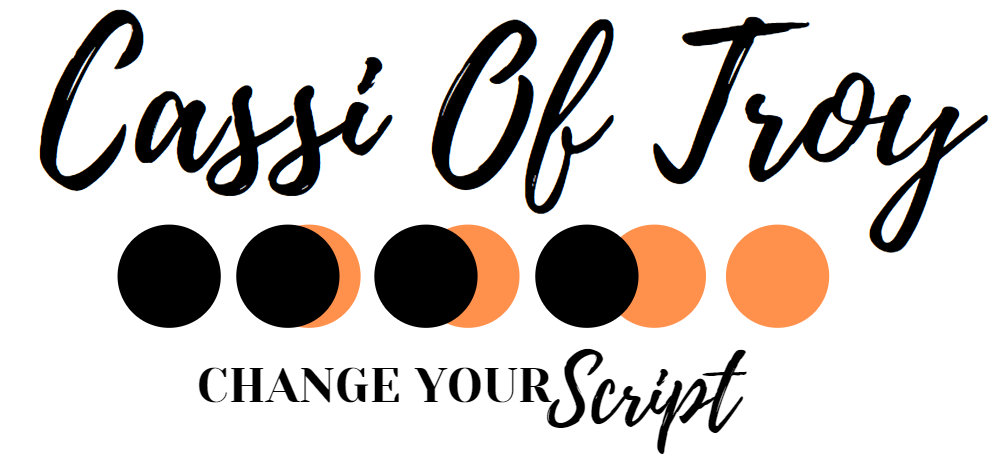How Long Does It Take To Set Up A Blog?
Table of Contents
It depends on whether you are referring to a beginner or a seasoned blogger to answer how long does it take to set up a blog. For a beginner, anywhere from a day or 2 and for someone more seasoned and experienced, it could be 2 to 4 hours. As with anything, practice makes perfect.
In this blog post, I am going to walk you through how I go about structuring and writing my blogs, step-by-step. When I started blogging in 2019, it took me roughly about 8 hours to do my research, do my outline, write, re-write, decide on images, make corrections and then finally publish.
Now, that process is almost an art and I can research, write and publish my blog in a couple of hours, 4 at most. On some days, I even get out 2 good articles.
It takes time, like any new skill you are learning to move from science and process to being an artist. But, with practice, you can become as good as you want to be.
What Is A Blog?
Let’s start here. Do you know what a blog is?
There are other terms that are used interchangeably such as, blog post, article, journal, story, etc. For the purpose of this article, we will say blog.
Blog is short for weblog. If you break that word into two, web-log, you will get a better understanding of what a blog represents and how it is structured.
Web refers to the World Wide Web (WWW), the internet.
Sometime around 1993, a guy started a diary on the internet. A personal page that he used to write and jot about himself, life, activities, interests, etc. A log, you could say.
A few years later, someone coined the word “weblog” to describe the activity of logging research findings and information while browsing on the internet.
Soon, “weblog” became “blog” when a Programmer shortened it in 1999, leading to the word being announced as Merriam-Webster’s Word of the Year in 2004.
STEP 1 – What Is Your Niche?
Now that you understand the historical context of a blog, you may be saying: “Ahhhhh . . ., I get it!”
A blog is simply a collection of articles, in a container that is called a website, on the internet or World Wide Web. A website is centered on a topic of interest which is called a niche. (Pronounced, neesh or nich).
When you are choosing a niche to blog about, it is best to choose a hobby, interest or passion that you will enjoy spending time researching and writing about.
A blog is just one article or post on your website. To build a following and engage your visitors, you will need to provide them with a range of perspectives, thoughts and information on your chosen niche.
STEP 2 – WordPress Or Not?
So, now that you have chosen your niche, you need to decide on a platform to build your website and manage its contents. The WordPress platform powers more than one-third of the world’s websites. It is flexible, scalable and free.
If WordPress (WP) is free then why should you spend money to build your website?
Great question!
Although WP is free, hosting for your website, especially if you want to monetize it and create an online business, requires power and security. The cost of hosting and a robust content management system can add up and become quite costly. It is suggested that you do your research BEFORE you make a decision.
Some alternatives to WP include:
- Joomla
- Shopify
- Magento
- Webflow
- Squarespace
- Wix
- Weebly
- Mozello
- Wealthy Affiliate and,
- Blogger
Before considering these alternatives to WP, ensure that you will not have to add more spending for add-ins and modifications. Choose a platform that gives you the best-integrated value for your money and state-of-the-art security.
STEP 3 – Which Hosting Platform?
A hosting platform is like a mall for your website on the internet. It allows you to make your website accessible to your visitors and customers via the World Wide Web.
With this in mind, you will understand that, apart from the hosting platform itself, you will need additional services such as security, daily back-ups, website support, themes, speed and other key elements that help your website earn authority, credibility and, of course, traffic!
You do not want a website that is problematic or not easy to access.
After a year of trying out other hosting platforms, I finally invested in a platform that provides me with all these services, and much more, for a low monthly fee.
But, before you decide, CLICK HERE to review the 7 key things that you need to consider.
STEP 4 – Which Theme Should You Use?
This is another factor that gets many people in a twist. Getting caught up in the aesthetics tends to get you carried away and soon you are no longer investing your efforts where they matter most – in your content.
Remember your niche? That is where most of your time and energy should be spent and it is quite a simple process. But, we’ll get back to that in a moment.
There are thousands – yes, THOUSANDS – of themes available to choose from. However, when deciding on a theme, support should be a top-of-the-list criterion. That, and the stability it provides for your website.
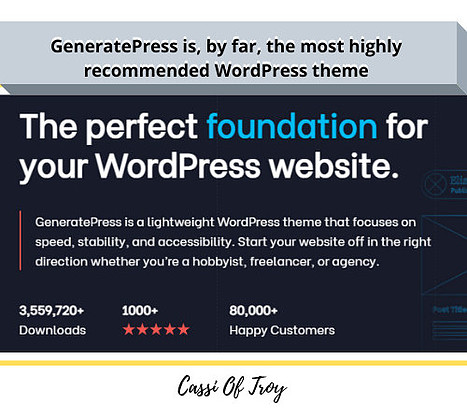
Over the years, I have tried many themes:
- Astra
- Divi
- Avada
- Twenty Seventeen
- Twenty Nineteen
- OceanWP
and more.
I always came back to GeneratePress though. Now use it for all my websites and, I always recommend it to my clients.
The only downside of using GeneratePress is that, in the beginning, it takes a bit longer to build beautiful pages because there is no drag and drop. But the result is a more code compliant and lighter website which makes for an excellent User Experience (UX).
STEP 5 – What Should You Write About?
Within your chosen niche, there will be thousands of topics and titles for you to choose from and finding them is easy. Actually, it is much easier than you think.
Keyword research is what you will be involved in at this stage. In essence, this means researching the topics and titles that people want to know about or are looking to find answers for.
And in today’s world, where do people go to find their answers?
Exactly!
The Search Engines like Google, YouTube, Bing and Yahoo.
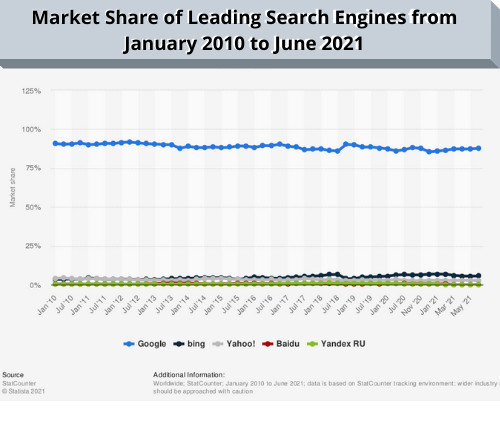
Google is the #1 Search Engine but did you know that YouTube is the #2 with over 3 BILLION searches a month and owned by Google?
With your niche in mind, you head over to Google and enter your keywords – what people are searching for.
Here’s an example, using coffee beans as my keywords:
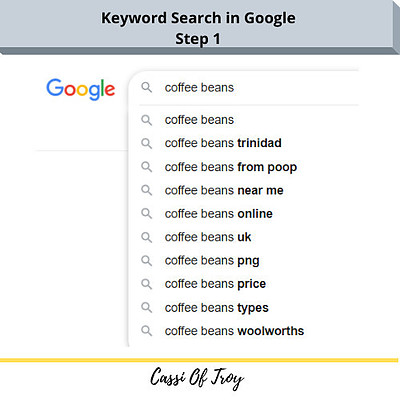
This keyword search also gives me additional search words that people are inputting in Google to find information, make purchases or simply browse. Each of these can become a blog.
With one simple addition, ‘what‘, see what (pun intended) happens:
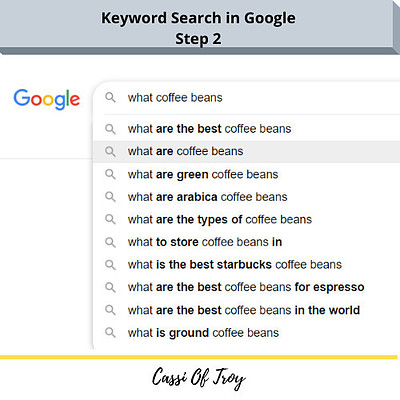
Again, another list of keywords showing what people are actually looking for in Google that can become blogs for my niche website on coffee beans.
20 blog titles is not a bad start for a couple of minutes of keyword research!
STEP 6 – How Should I Structure My Blog?
Let’s go over what we have accomplished:
- Content management system – CHECK
- Hosting platform – CHECK
- Niche – CHECK
- Theme – CHECK
- Keywords – CHECK
- Blog Titles – CHECK
The first 4 items are 1-time choices.
Now you are going to rinse and repeat:
- Keywords
- Blog Title
- Write Post
- Publish
Your structure will be no different to how you would write an essay:
- INTRODUCTION
- PARAGRAPH 1
- PARAGRAPH 2
- PARAGRAPH 3
- PARAGRAPH 4
- CONCLUSION
The length of your blog will vary anywhere from about 800 to 2,00 words, depending on your topic, the depth of your research and the information you want to convey.
As you begin, these elements may occupy 2-4 hours of your time each but soon you will get into a rhythm and organise your time to make the most effective use of your resources.
I tend to work with blocks of time.
About twice a month, I spend roughly 3-4 hours doing keyword research and building my inventory. That way I have a good idea of what topics I want to cover for the upcoming months.
I then break those down into weekly themes and daily blog titles. (about 2 hours a week)
My blog layouts are done weekly for each day. (about 2 hours a week)
Every day, I spend about 1-2 hours writing my blog, fine-tuning and publishing.
Closing Thoughts . . . Will You be Successful?
So now that you have a better understanding of what foundation goes into setting up a blog post, it is easier for you to answer the question – how long does it take to set up a blog?
Starting a website and blogging is a great way to build passive, sustainable income. All you need to invest is time to learn, the right mindset to train and implement and, a community to support you.
Remember your niche? Your interest, passion, hobby?
It’s time to bring that forward and start working with it. I will repeat. Make sure that the niche you choose is something that will hold your interest for a long time, especially if you are serious about making an income from your website.
You will be in this for the long haul and the last thing you want to do is to lose interest along the way. The internet is littered with dead websites. Of the 1.8 billion websites on the internet, according to Internet Live Stats, only about 200 million are active.
This shows that if you do want to make your mark on the World Wide Web, it is very possible. The key thing is to remain consistent and be here for the long term.
Success is in your hands.
Leave Us a Comment
If you have any thoughts, comments, feedback or questions please let us know in the comment section below.
It would be a pleasure to hear from you and to help you get started with your online venture.

